(4)倒装主谓一致情态动词交际用语
主谓一致与倒装句

主谓一致与倒装句主谓一致是英语语法中的一个重要概念,它要求句子中的主语和谓语在人称和数上保持一致。
主谓一致错误会导致句子的构成混乱,影响语言的准确性和流畅性。
另外,在一些特定的情况下,倒装句也被广泛应用。
本文将详细探讨主谓一致和倒装句的使用规则和例子。
一、主谓一致主谓一致是指主语和谓语在人称和数上保持一致。
一般来说,如果主语是单数第三人称,则谓语动词需要加上-s或-es;如果主语是复数,谓语动词则保持原形。
主谓一致错误的例子如下:1. 错误:He like coffee. (正确:He likes coffee.)2. 错误:The dogs is barking. (正确:The dogs are barking.)二、主谓一致规则1. 单数主语:单数主语需要用单数形式的谓语动词。
例子:- The sun shines brightly.- My friend plays the piano.2. 复数主语:复数主语需要用复数形式的谓语动词。
例子:- The students are studying for the exam.- Cats like to chase mice.3. 不可数名词:不可数名词作为主语时,需要用单数形式的谓语动词。
例子:- Water is essential for life.- Music brings people joy.4. 主语连接词:如果主语由两个或更多的部分组成,用and连接,那么需要用复数形式的谓语动词。
例子:- Tom and Jerry are good friends.- His parents work in a hospital.5. 复数名词指一类事物:当复数名词指代一类事物时,需要用单数形式的谓语动词。
例子:- Mathematics is my favorite subject.- Politics is a sensitive topic.三、倒装句倒装句是指将谓语动词放在主语之前的句子结构。
中考英语复习:主谓一致和倒装句

中考英语复习:主谓一致和倒装句从单项选择到书面表达,都可能涉及到主谓一致的题,是中考试卷必考题目。
主谓一致是指谓语动词与主语在人称和数上保持一致。
主谓一致必须遵循三个原则,即语法一致原则、意义一致原则、就近一致原则。
语法一致原则是指主语和谓语在语法形式上保持一致,即主语是单数形式,谓语动词用单数形式,主语是复数形式,谓语也用复数形式。
意义一致原则是主语意义上的单复数要与谓语的单复数形式一致,即主语形式上为单数,但意义为复数,则谓语动词用复数形式;若主语形式上为复数,但表示单数意义,则谓语动词用单数形式。
就近一致原则也叫邻近原则,是指谓语动词的单、复数形式取决于最靠近它的主语。
倒装句因为与汉语语言习惯的不同和较多的句型结构而成为初中英语的难点,在中考试卷中也总有一定的比例,尤其在阅读理解和完形填空中对上下文的理解会有很大的影响,因此也是中考复习的重点。
语法一致原则谓语和主语通常从语法形式上取得一致,主语为单数形式,谓语动词也用单数形式;主语为复数形式,谓语动词也为复数形式。
如:The boy is clever enough to study maths well.这个男孩够聪明,可以把数学学好。
Everybody in my class tries to do well in English.我们班每个人都努力学好英语。
下列情况谓语动词只能用单数:1)不可数名词或可数名词单数作主语,谓语动词用单数形式。
如:Water is very important to the trees.水对树来说非常重要。
2)动词不定式或者动名词短语作主语时,谓语动词用单数形式。
如:To improve your English is the most important work.提高你的英语是最重要的工作。
Watching TV too much is bad for your eyes.看电视太多对你的眼睛有害。
主谓一致和倒装句

主谓一致主谓一致(concord),是指主语和谓语动词要保持人称和数上的一致。
英语中动词be的变化形式最多,如I am,You are,He is,We are等。
主语I一定要用am的动词形式,这就叫‚主谓一致‛。
主谓一致的三个原则:主谓一致涉及三个基本原则,即语法一致原则(principle of grammatical concord)、意义一致原则(principle of notional concord)和就近原则(principle of proximity)。
一、语法一致原则主语和谓语通常是在语法形式上取得一致,即主语是单数形式时,谓语动词也采用单数形式;主语是复数形式时,谓语动词也采用复数形式。
1.当and或both ...and...连接两个或多个名词作主语时,谓语动词用复数形式。
Tom and Mike are good friends.汤姆和迈克是好朋友。
Both Lucy and Lily are students.露西和丽丽都是学生。
2.不定代词either, neither, each one, the other, another, anybody, anyone, anything, someone, somebody, something, everyone, everybody, everything, nobody, no one, nothing等作主语时,谓语动词用单数形式。
Is there anything wrong with your bike? 你的自行车有什么毛病吗?Everyone is ready for the sports meeting.大家都为运动会做好了准备。
3.由each,each...and each...,every...and every...,every...作主语时,谓语动词用单数形式。
Each boy and each girl was given a new book.每个男孩和女孩都收到了一本新书。
英语语法大招100条
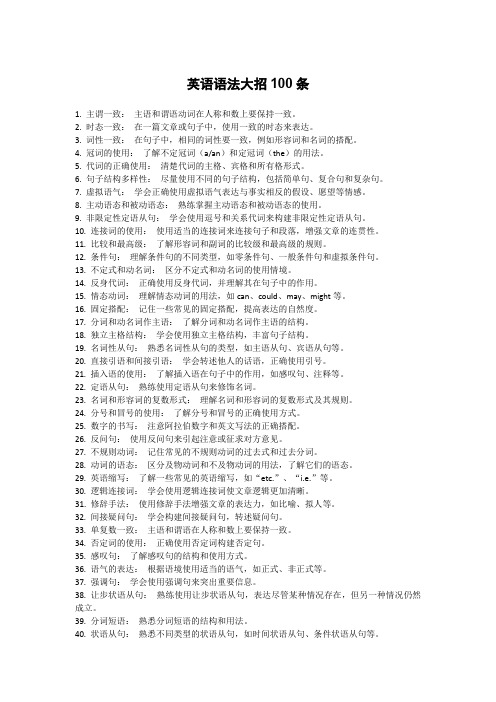
英语语法大招100条1. 主谓一致:主语和谓语动词在人称和数上要保持一致。
2. 时态一致:在一篇文章或句子中,使用一致的时态来表达。
3. 词性一致:在句子中,相同的词性要一致,例如形容词和名词的搭配。
4. 冠词的使用:了解不定冠词(a/an)和定冠词(the)的用法。
5. 代词的正确使用:清楚代词的主格、宾格和所有格形式。
6. 句子结构多样性:尽量使用不同的句子结构,包括简单句、复合句和复杂句。
7. 虚拟语气:学会正确使用虚拟语气表达与事实相反的假设、愿望等情感。
8. 主动语态和被动语态:熟练掌握主动语态和被动语态的使用。
9. 非限定性定语从句:学会使用逗号和关系代词来构建非限定性定语从句。
10. 连接词的使用:使用适当的连接词来连接句子和段落,增强文章的连贯性。
11. 比较和最高级:了解形容词和副词的比较级和最高级的规则。
12. 条件句:理解条件句的不同类型,如零条件句、一般条件句和虚拟条件句。
13. 不定式和动名词:区分不定式和动名词的使用情境。
14. 反身代词:正确使用反身代词,并理解其在句子中的作用。
15. 情态动词:理解情态动词的用法,如can、could、may、might等。
16. 固定搭配:记住一些常见的固定搭配,提高表达的自然度。
17. 分词和动名词作主语:了解分词和动名词作主语的结构。
18. 独立主格结构:学会使用独立主格结构,丰富句子结构。
19. 名词性从句:熟悉名词性从句的类型,如主语从句、宾语从句等。
20. 直接引语和间接引语:学会转述他人的话语,正确使用引号。
21. 插入语的使用:了解插入语在句子中的作用,如感叹句、注释等。
22. 定语从句:熟练使用定语从句来修饰名词。
23. 名词和形容词的复数形式:理解名词和形容词的复数形式及其规则。
24. 分号和冒号的使用:了解分号和冒号的正确使用方式。
25. 数字的书写:注意阿拉伯数字和英文写法的正确搭配。
26. 反问句:使用反问句来引起注意或征求对方意见。
2024年新高考版英语主谓一致、虚拟语气、省略、倒装、强调讲解部分

“a number of+复数名词”作主 A number of other plants were
语时,谓语动词用复数形式,意为 found in America.在美洲还发现
“许多……”;“the number of+ 了许多其他的植物。
复数名词”作主语时,谓语动词 The number of people who travel
复合不定代词someone、anyone、everyone、nobody/no one、something、anything、everything、nothing等作主语时,谓语动词用单数
If anyone sees Lisa, ask her to call me.如果有人看 到莉萨,请她给我打个电话。 Nothing is impossible to a willing heart.世上无难 事,只怕有心人。
If he shouldn't come tomorrow, we would put off the meeting.如果他 明天不来,我们就推迟 这个会议。
使用“(should+)动词原形”的虚拟语气 1.用于宾语从句 以下动词后的宾语从句常常使用虚拟语气,即谓语为“(should+)动词原 形”。
原则
意义 一致
课标必备点梳理
常见用法
例句
当“几分之几/百分之几/half/ the rest/most+of+名词”结构作 主语时,一般根据of后的名词的 单复数决定谓语动词的单复数
20% of the people in the city object to the price of running water going up. 这个城市中百分之二十的人反 对自来水价格上调。
倒装句语法知识点归纳总结
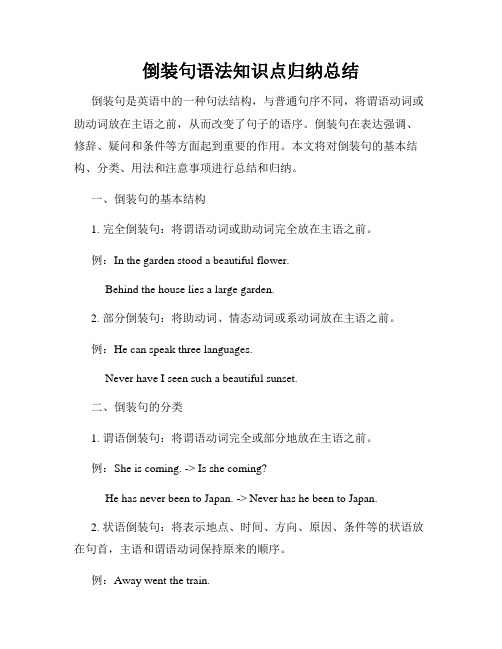
倒装句语法知识点归纳总结倒装句是英语中的一种句法结构,与普通句序不同,将谓语动词或助动词放在主语之前,从而改变了句子的语序。
倒装句在表达强调、修辞、疑问和条件等方面起到重要的作用。
本文将对倒装句的基本结构、分类、用法和注意事项进行总结和归纳。
一、倒装句的基本结构1. 完全倒装句:将谓语动词或助动词完全放在主语之前。
例:In the garden stood a beautiful flower.Behind the house lies a large garden.2. 部分倒装句:将助动词、情态动词或系动词放在主语之前。
例:He can speak three languages.Never have I seen such a beautiful sunset.二、倒装句的分类1. 谓语倒装句:将谓语动词完全或部分地放在主语之前。
例:She is coming. -> Is she coming?He has never been to Japan. -> Never has he been to Japan.2. 状语倒装句:将表示地点、时间、方向、原因、条件等的状语放在句首,主语和谓语动词保持原来的顺序。
例:Away went the train.In the distance could be seen a tall tower.3. 主从倒装句:主句和从句中的主语-谓语结构进行倒装。
例:Not until she finished her homework did she go to bed.Only when the rain stopped could we go outside.三、倒装句的用法1. 强调句:通过倒装句,可以将句子的某一部分进行强调,常用的结构是完全倒装句和部分倒装句。
例:Not only did he win the game, but he also broke the record.Under no circumstances should you touch the red button.2. 疑问句:直接将谓语动词或助动词放在主语之前形成疑问句。
高中英语知识点归纳句子的主谓一致和倒装结构
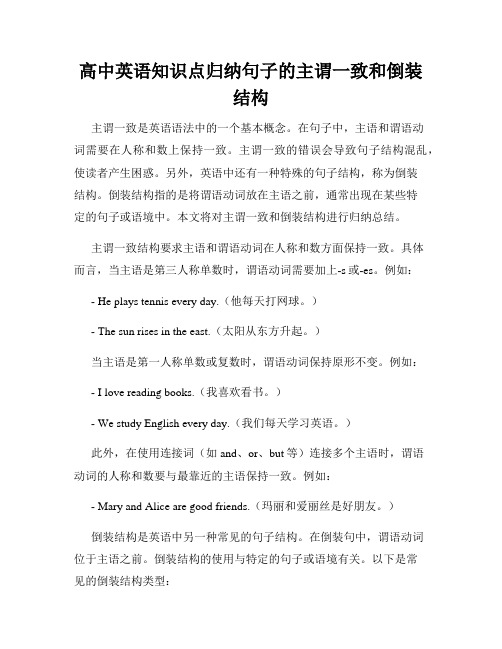
高中英语知识点归纳句子的主谓一致和倒装结构主谓一致是英语语法中的一个基本概念。
在句子中,主语和谓语动词需要在人称和数上保持一致。
主谓一致的错误会导致句子结构混乱,使读者产生困惑。
另外,英语中还有一种特殊的句子结构,称为倒装结构。
倒装结构指的是将谓语动词放在主语之前,通常出现在某些特定的句子或语境中。
本文将对主谓一致和倒装结构进行归纳总结。
主谓一致结构要求主语和谓语动词在人称和数方面保持一致。
具体而言,当主语是第三人称单数时,谓语动词需要加上-s或-es。
例如:- He plays tennis every day.(他每天打网球。
)- The sun rises in the east.(太阳从东方升起。
)当主语是第一人称单数或复数时,谓语动词保持原形不变。
例如:- I love reading books.(我喜欢看书。
)- We study English every day.(我们每天学习英语。
)此外,在使用连接词(如and、or、but等)连接多个主语时,谓语动词的人称和数要与最靠近的主语保持一致。
例如:- Mary and Alice are good friends.(玛丽和爱丽丝是好朋友。
)倒装结构是英语中另一种常见的句子结构。
在倒装句中,谓语动词位于主语之前。
倒装结构的使用与特定的句子或语境有关。
以下是常见的倒装结构类型:1. 完全倒装结构:主语与谓语动词完全颠倒。
常用于以副词、介词短语或状语从句开头的句子中。
例如:- In the garden sat a beautiful girl.(花园里坐着一个漂亮的女孩。
)- Not only did he pass the exam, but he also got the highest score.(他不仅通过了考试,而且还获得了最高分。
)2. 部分倒装结构:只将助动词、情态动词或系动词放在主语之前,而谓语动词仍然位于主语之后。
主谓一致和倒装句

语法一致原则
8. 某些只有复数形式的名词(如clothes, trousers, shorts, pants, shoes, gloves…)作 主语时,谓语动词用复数形式。如: • My shoes were worn out. 我的鞋子穿坏了。 9. 不定式或v.-ing形式作主语时,谓语动词用 单数形式。如: • Reading is learning.
语法一致原则
6. “a lot of (lots of, plenty of, a pile of, piles of, most of) + 名词”和“分数或百分数 + 名词”等作主语时,谓语动词的单复数形 式取决于名词,如果是不可数名词,则谓 语动词用单数形式;如果是可数名词复数 ,则谓语动词用复数形式。如: • Lots of people have been there. 很多人去过那儿。
语法一致原则
2. 不定代词either, neither, each one, the other, another, anybody, anyone, anything, someone, somebody, something, everyone, everybody, everything, nobody, no one, nothing等作主语时 ,谓语动词用单数形式。如: • Is there anything wrong with your bike? 你的自行车有什么毛病吗? • Everyone is ready for the sports meeting. 大家都为运动会做好了准备。
倒 装 句
(2)这两种结构的不同点是: • “so + 助动词/ be动词/ 情态动词 + 主语”依附于 肯定句,表示前边的肯定情况也适合后边的人, 意为“……也……” • “neither + 助动词/ be动词/ 情态动词 + 主语”依 附于否定句,表示前边的否定情况也适合后边的 人,意为“……也不……”。如: • Tom watched TV last night, so did Ann. 汤姆昨晚看电视了,安也看了。 • Mary didn’t watch TV last night, neither did Jim. 玛丽昨晚没有看电视,吉姆也没看。
倒装句主谓一致口诀
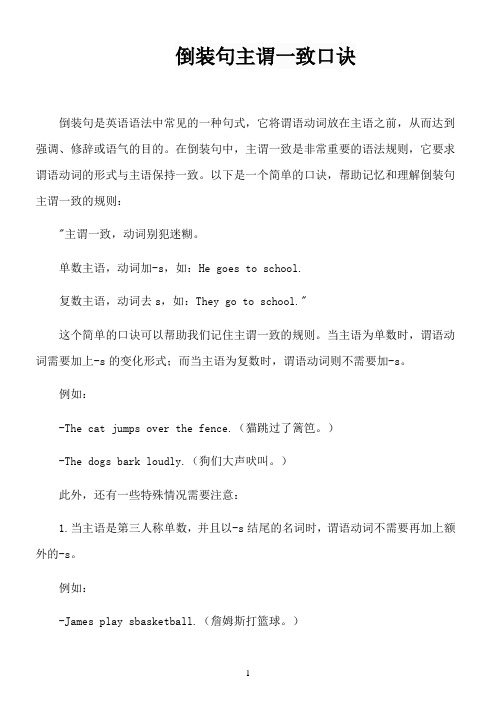
倒装句主谓一致口诀倒装句是英语语法中常见的一种句式,它将谓语动词放在主语之前,从而达到强调、修辞或语气的目的。
在倒装句中,主谓一致是非常重要的语法规则,它要求谓语动词的形式与主语保持一致。
以下是一个简单的口诀,帮助记忆和理解倒装句主谓一致的规则:"主谓一致,动词别犯迷糊。
单数主语,动词加-s,如:He goes to school.复数主语,动词去s,如:They go to school."这个简单的口诀可以帮助我们记住主谓一致的规则。
当主语为单数时,谓语动词需要加上-s的变化形式;而当主语为复数时,谓语动词则不需要加-s。
例如:-The cat jumps over the fence.(猫跳过了篱笆。
)-The dogs bark loudly.(狗们大声吠叫。
)此外,还有一些特殊情况需要注意:1.当主语是第三人称单数,并且以-s结尾的名词时,谓语动词不需要再加上额外的-s。
例如:-James play sbasketball.(詹姆斯打篮球。
)2.当主语是第三人称单数,并且以不发音的字母结尾(如:s,x,z,ch,sh)时,谓语动词需要加上-es的变化形式。
例如:-She watches TV every night.(她每晚看电视。
)-The box closes automatically.(盒子会自动关闭。
)3.当主语是第一人称单数或复数时,谓语动词使用基本形式,不需要加上任何变化。
例如:-I love to read books.(我喜欢读书。
)-We enjoy playing soccer.(我们喜欢踢足球。
)这个口诀可以帮助我们记住倒装句中主谓一致的规则,但在实际应用中还需要根据具体的语境和语法要求进行判断和运用。
通过不断练习和阅读,我们可以更好地掌握和理解英语语法中的各种规则。
掌握英语中的主谓一致和倒装语序的使用

掌握英语中的主谓一致和倒装语序的使用英语是世界上最广泛使用的语言之一,掌握好英语语法是学习和运用英语的基础。
在英语语法中,主谓一致和倒装语序是两个常见但容易出错的问题。
本文将详细介绍主谓一致和倒装语序的使用,帮助读者更好地运用英语。
一、主谓一致主谓一致是指主语和谓语在人称和数上保持一致。
具体来说,当主语是单数时,谓语动词要用单数形式;当主语是复数时,谓语动词要用复数形式。
例如:- She likes to read books.(她喜欢读书。
)- They are playing basketball.(他们正在打篮球。
)主谓一致的错误常见于复合主语、连接词和不定代词等情况下。
在处理这些情况时,需要注意以下几点:1. 复合主语:当主语由两个或更多个名词组成时,谓语动词的形式取决于最靠近谓语动词的名词。
例如:- The dog and the cat are sleeping.(狗和猫正在睡觉。
)- His parents and his sister are coming.(他的父母和他的妹妹要来了。
)2. 连接词:当主语由连接词连接时,谓语动词的形式取决于连接词后面的名词。
例如:- Neither the teacher nor the students are here.(既不是老师也不是学生在这里。
)- Either the book or the pen is on the table.(要么书在桌子上,要么钢笔在桌子上。
)3. 不定代词:一些不定代词作为主语时,谓语动词的形式取决于不定代词所表示的数量。
例如:- Everyone is invited to the party.(每个人都受邀参加派对。
)- Some of the apples are rotten.(一些苹果是烂的。
)二、倒装语序倒装语序是指把谓语动词放在主语之前的语序。
倒装语序常用于以下几种情况:1. 否定词位于句首:当句子以否定词开头时,为了强调否定的意思,谓语动词和主语要倒装。
中的主谓一致和倒装语序有哪些规则
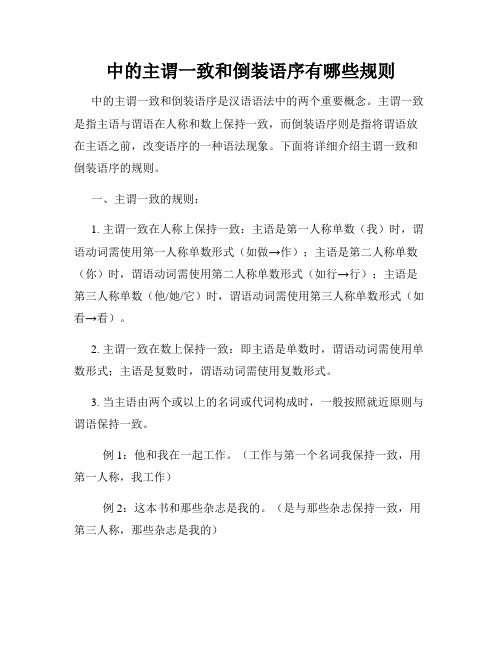
中的主谓一致和倒装语序有哪些规则中的主谓一致和倒装语序是汉语语法中的两个重要概念。
主谓一致是指主语与谓语在人称和数上保持一致,而倒装语序则是指将谓语放在主语之前,改变语序的一种语法现象。
下面将详细介绍主谓一致和倒装语序的规则。
一、主谓一致的规则:1. 主谓一致在人称上保持一致:主语是第一人称单数(我)时,谓语动词需使用第一人称单数形式(如做→作);主语是第二人称单数(你)时,谓语动词需使用第二人称单数形式(如行→行);主语是第三人称单数(他/她/它)时,谓语动词需使用第三人称单数形式(如看→看)。
2. 主谓一致在数上保持一致:即主语是单数时,谓语动词需使用单数形式;主语是复数时,谓语动词需使用复数形式。
3. 当主语由两个或以上的名词或代词构成时,一般按照就近原则与谓语保持一致。
例1:他和我在一起工作。
(工作与第一个名词我保持一致,用第一人称,我工作)例2:这本书和那些杂志是我的。
(是与那些杂志保持一致,用第三人称,那些杂志是我的)4. 当主谓之间有连接词“和”、“与”等时,一般按照就近原则与谓语保持一致。
例:他和我喜欢读书。
(喜欢与第一个名词我保持一致,用第一人称单数形式,我喜欢读书)二、倒装语序的规则:1. 在某些特定句型中,谓语动词可以位于主语之前,形成倒装语序。
例1:在句首为表示地点、方向、时间的介词短语时- 在房间里跑来跑去的是孩子们。
- 下班后回家的是爸爸。
例2:在句首为表示否定意义的词语时- 从未见过如此美丽的风景。
- 经济困难,但决不放弃。
2. 在以“只有”、“不但”、“没有”等词开头的句子中,为了强调,也会出现倒装语序。
例1:只有勤奋才能取得成功。
例2:没有秘密是永远无法保守的。
3. 在以“so”、“neither”、“nor”等词开头的句子中,表达前文所述的情况也会采用倒装语序。
例1:So difficult is the task that no one wants to take it.例2:Neither will I give up nor will I lose hope.综上所述,中的主谓一致和倒装语序有一定的规则可循。
情态动词、主谓一致、倒装句
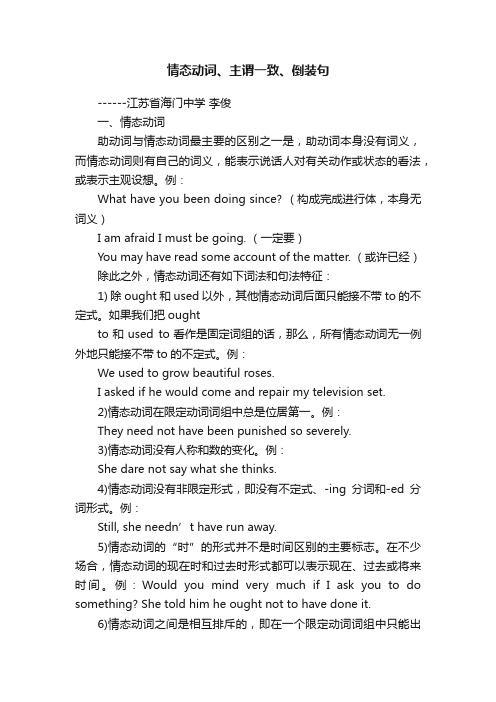
情态动词、主谓一致、倒装句------江苏省海门中学李俊一、情态动词助动词与情态动词最主要的区别之一是,助动词本身没有词义,而情态动词则有自己的词义,能表示说话人对有关动作或状态的看法,或表示主观设想。
例:What have you been doing since? (构成完成进行体,本身无词义)I am afraid I must be going. (一定要)You may have read some account of the matter. (或许已经)除此之外,情态动词还有如下词法和句法特征:1) 除ought和used以外,其他情态动词后面只能接不带to的不定式。
如果我们把oughtto和used to看作是固定词组的话,那么,所有情态动词无一例外地只能接不带to的不定式。
例:We used to grow beautiful roses.I asked if he would come and repair my television set.2)情态动词在限定动词词组中总是位居第一。
例:They need not have been punished so severely.3)情态动词没有人称和数的变化。
例:She dare not say what she thinks.4)情态动词没有非限定形式,即没有不定式、-ing分词和-ed分词形式。
例:Still, she needn’t have run away.5)情态动词的“时”的形式并不是时间区别的主要标志。
在不少场合,情态动词的现在时和过去时形式都可以表示现在、过去或将来时间。
例:Would you mind very much if I ask you to do something? She told him he ought not to have done it.6)情态动词之间是相互排斥的,即在一个限定动词词组中只能出现一个情态动词,但有时却可以与助动词have和be连用。
专四常用术语

专四常用术语1. “固定搭配”嘿,专四里面固定搭配可太重要啦!就像盖房子得有稳固的砖头组合一样。
比如说“take into account”,这个搭配在句子“He should take into account her feelings before making a decision.”里就很自然。
如果用错了搭配,那整个句子就像搭错积木的房子,摇摇欲坠。
2. “虚拟语气”哎虚拟语气真的有点让人头疼呢。
它就像一种幻想的语法世界。
例如“If I were you, I would study harder for the TEM - 4.” 你看,这不是真实发生的情况,而是一种假设。
要是搞不懂虚拟语气,就像在迷雾中走路,很容易迷失方向。
3. “同义词替换”专四里同义词替换超有用的呀。
这就像你有好多套不同风格但功能一样的衣服。
比如“big”,你可以说“large”或者“huge”。
在作文里用上同义词替换,就像给你的文字换了一身漂亮又新颖的衣服,多酷啊。
4. “动名词作主语”动名词作主语也是个常见的点哦。
它就像是一群小伙伴里的小队长。
像“Swimming is my favorite sport.”这里“swimming”就是动名词作主语。
如果不懂这个,就像队伍没了队长,乱成一团啦。
5. “限定性定语从句”限定性定语从句可是个好东西呢。
它就像给名词贴上一个专属的标签。
例如“I like the book which has a red cover.”这个“which has a red cover”就清楚地指出是哪本“book”,要是没有这个从句,就像指着一堆书却不知道说的是哪本,多迷糊啊。
6. “非限定性定语从句”非限定性定语从句呢,有点像给句子加了个小注解。
比如“My mother, w ho is a kind woman, loves cooking.”这个“who is a kind woman”就是补充说明“my mother”的额外信息。
英语语法倒装句与主谓一致

2 (1).在以here、there、now、then等副词开 头的句子里。 “Here, There, Now, Then + come (或be,go,lie,run) + 主语" 结构。 Here comes the old lady! Then came the hour we had been looking forward to. There comes the bus. Now comes your turn. 如果主语是人称代词,就不用倒装。如: Here you are. There she comes.
二、部分倒装
部分倒装是把be动词、情态动词、助动 词放到主语之前。如果句子中没有这些词, 要在主语之前加助动词do / does / did等,而把 原来的谓语动词变成原形放在主语之后。
句首状语为否定词或半否定词的句子。 1. 句首状语为否定词或半否定词的句子。 这类词或短语主要有never, neither, nor, little, seldom(很少,不常), rarely(很少,罕有), 很少, 很少,罕有) 很少 不常) hardly, scarcely(几乎不,简直没有), no sooner 几乎不,简直没有) 立即) 决不) (立即), not only, in no way(决不), at no time, few, not, no等, 如: Not a word did I say to him. Never have I found him so happy. Little does he care about what I said. I can't swim. Neither can he. No sooner had he gone to bed than he fell asleep.
主谓一致与主谓倒装的规则归纳

主谓一致与主谓倒装的规则归纳主谓一致是指句子中的主语和谓语在人称和数上要保持一致。
而主谓倒装是指将句子中的主语与谓语的位置颠倒过来。
这两种语法结构在英语中经常出现,掌握它们的规则对于正确运用语言至关重要。
本文将对主谓一致和主谓倒装的规则进行归纳总结。
一、主谓一致的规则1. 单数主语(singular subject)通常与单数谓语动词(singular verb)搭配,例如:- The boy plays soccer.(这个男孩踢足球。
)- She sings beautifully.(她唱得很美。
)2. 复数主语(plural subject)通常与复数谓语动词(plural verb)搭配,例如:- The boys play basketball.(这些男孩打篮球。
)- They laugh loudly.(他们笑得很大声。
)3. 特殊情况:当主语为复数名词时,却包含单数意义时,谓语动词应使用单数形式,例如:- The news is shocking.(这则消息令人震惊。
)- Physics is my favorite subject.(物理是我最喜欢的科目。
)4. 当主语是以“each”、“every”、“no”、“either”、“neither”等词开头时,谓语动词通常使用单数形式,例如:- Each student has a book.(每个学生都有一本书。
)- No one knows the answer.(没有人知道答案。
)5. 当主语由两个或多个并列名词(coordinate nouns)构成,且用“and”连接时,谓语动词通常使用复数形式,例如:- Tom and Jerry are good friends.(汤姆和杰里是好朋友。
)- Apples and oranges are popular fruits.(苹果和橙子是受欢迎的水果。
)二、主谓倒装的规则1. 当句子以副词或短语开头时,主谓倒装常常发生,例如:- In the garden stands a beautiful tree.(花园里有一棵漂亮的树。
主谓一致、强调句和倒装句、情态动词和虚拟语气讲解以及习题详细解析
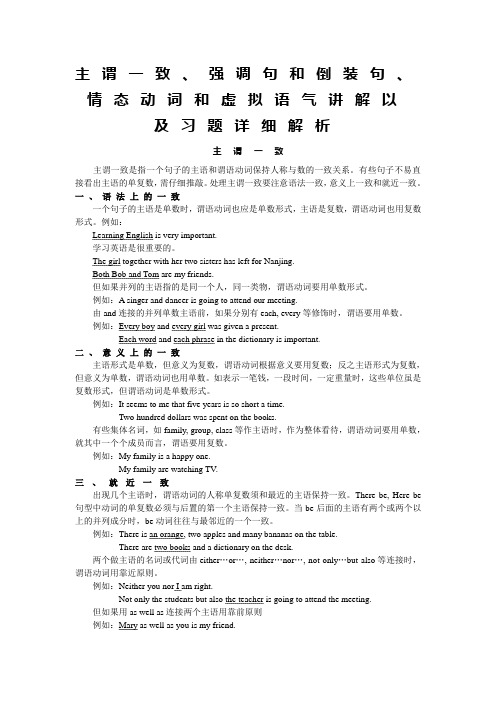
主谓一致、强调句和倒装句、情态动词和虚拟语气讲解以及习题详细解析主谓一致主谓一致是指一个句子的主语和谓语动词保持人称与数的一致关系。
有些句子不易直接看出主语的单复数,需仔细推敲。
处理主谓一致要注意语法一致,意义上一致和就近一致。
一、语法上的一致一个句子的主语是单数时,谓语动词也应是单数形式,主语是复数,谓语动词也用复数形式。
例如:Learning English is very important.学习英语是很重要的。
The girl together with her two sisters has left for Nanjing.Both Bob and Tom are my friends.但如果并列的主语指的是同一个人,同一类物,谓语动词要用单数形式。
例如:A singer and dancer is going to attend our meeting.由and连接的并列单数主语前,如果分别有each, every等修饰时,谓语要用单数。
例如:Every boy and every girl was given a present.Each word and each phrase in the dictionary is important.二、意义上的一致主语形式是单数,但意义为复数,谓语动词根据意义要用复数;反之主语形式为复数,但意义为单数,谓语动词也用单数。
如表示一笔钱,一段时间,一定重量时,这些单位虽是复数形式,但谓语动词是单数形式。
例如:It seems to me that five years is so short a time.Two hundred dollars was spent on the books.有些集体名词,如family, group, class等作主语时,作为整体看待,谓语动词要用单数,就其中一个个成员而言,谓语要用复数。
例如:My family is a happy one.My family are watching TV.三、就近一致出现几个主语时,谓语动词的人称单复数须和最近的主语保持一致。
中的倒装句与主谓一致

中的倒装句与主谓一致倒装句与主谓一致在英语语法中,倒装句与主谓一致是两个常见的语法现象。
倒装句在构造上与正常语序(主语+谓语)不同,而主谓一致则是指主语与谓语动词在人称和数上保持一致。
本文将详细介绍倒装句与主谓一致的用法及示例。
一、什么是倒装句倒装句是指将谓语动词放在主语之前的句子结构。
一般而言,倒装句的常见情形有以下几种:1. 在以副词或短语开头的句子中,如:"Had I known the truth, I would have acted differently." (如果我早知道真相,我会采取不同的行动。
)"Under no circumstances can you leave the building." (在任何情况下,你都不能离开大楼。
)2. 在以介词短语开头的句子中,如:"On the table sits a beautiful vase." (桌子上摆着一个漂亮的花瓶。
)"In front of the house stood a tall tree." (房子前面矗立着一棵高大的树。
)3. 在表示否定意义的副词或短语放在句首时,如:"Never have I seen such a breathtaking sunset." (我从未见过如此美丽的日落。
)"Little did he know about their plans." (他对他们的计划一无所知。
)二、倒装句的作用和表达方式倒装句的主要作用是为了强调句子中的某一成分,增强语气或改变句子的结构。
根据不同的句型和语法规则,倒装句的表达方式可以是完全倒装、部分倒装或否定倒装。
1. 完全倒装完全倒装是指将整个谓语动词与主语调换位置,形成倒装句。
例如:"Can you swim?" → "Swim you can?" (你会游泳吗?→ 你能游泳吗?)"Is he coming?" → "Coming is he?" (他要来吗?→ 他要来吗?)2. 部分倒装部分倒装是指将助动词、情态动词或系动词与主语调换位置,而将实义动词或其他成分保持不变。
完全倒装句与主谓一致
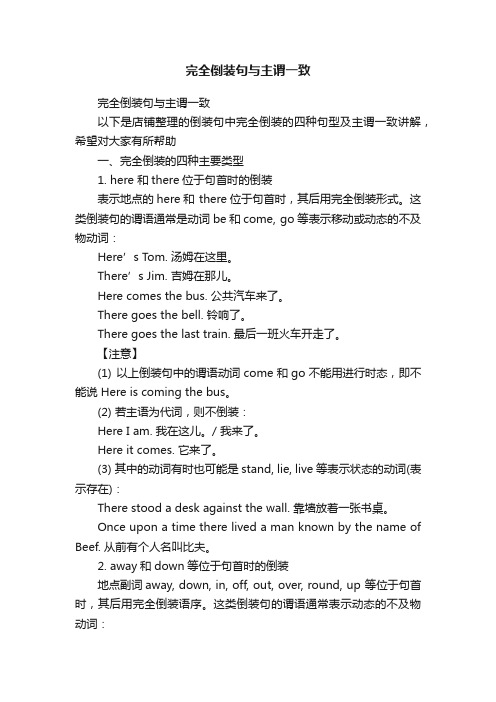
完全倒装句与主谓一致完全倒装句与主谓一致以下是店铺整理的倒装句中完全倒装的四种句型及主谓一致讲解,希望对大家有所帮助一、完全倒装的四种主要类型1. here 和there位于句首时的倒装表示地点的here和 there位于句首时,其后用完全倒装形式。
这类倒装句的谓语通常是动词be和come, go等表示移动或动态的不及物动词:Here’s Tom. 汤姆在这里。
There’s Jim. 吉姆在那儿。
Here comes the bus. 公共汽车来了。
There goes the bell. 铃响了。
There goes the last train. 最后一班火车开走了。
【注意】(1) 以上倒装句中的谓语动词come和go不能用进行时态,即不能说 Here is coming the bus。
(2) 若主语为代词,则不倒装:Here I am. 我在这儿。
/ 我来了。
Here it comes. 它来了。
(3) 其中的动词有时也可能是stand, lie, live等表示状态的动词(表示存在):There stood a desk against the wall. 靠墙放着一张书桌。
Once upon a time there lived a man known by the name of Beef. 从前有个人名叫比夫。
2. away和down等位于句首时的倒装地点副词away, down, in, off, out, over, round, up 等位于句首时,其后用完全倒装语序。
这类倒装句的谓语通常表示动态的不及物动词:Away went the runners. 赛跑选手们跑远了。
Round and round flew the plane. 飞机盘旋着。
The door opened and in came Mr Smith. 门开了,史密斯先生进了来。
Down came the rain and up went the umbrellas. 下雨了,伞都撑起来了。
- 1、下载文档前请自行甄别文档内容的完整性,平台不提供额外的编辑、内容补充、找答案等附加服务。
- 2、"仅部分预览"的文档,不可在线预览部分如存在完整性等问题,可反馈申请退款(可完整预览的文档不适用该条件!)。
- 3、如文档侵犯您的权益,请联系客服反馈,我们会尽快为您处理(人工客服工作时间:9:00-18:30)。
即墨实验高中高三英语语法专项训练(10)---主谓一致倒装句式设计人:柳维其审核人:高三英语组1.Such poets as Shakespeare widely read, of whose works, however, some __ difficult to understand. A. are;are B. is;is C. are;is D. is:are2.I told him what I was surprised _____ his attitude towards his study.A. isB. wasC. at isD. at was3.Barbara is easy to recognize as she’s the only one of the women who _______ evening dress.A.wearB.wearsC.has wornD.have worn4.Either you or one of your students ______ to attend the meeting that is due tomorrow.A. areB. isC. haveD. Be5.The country life he was used to ______ greatly since 2002.A. changeB. has changedC. changingD. have changed6.She has set a new record, that is, the sales of her latest book ___ 50 million.A. have reachedB. has reachedC. are reachingD. had reached7.All the scientific evidence ____ that increasing use of chemicals in farming _____ damaging our health.A. show; areB. shows; areC. show; isD. shows; is8._____ of the land in that district _____ covered with trees and grass.A. Two fifth, isB. Two fifth, areC. Two fifths, isD. Two fifths, are9.As a result of destroying the forest, a large ____ of desert ____ covered the land.A. number, hasB. quantity, hasC. number, haveD. quantity, have10.Every possible means _____ to prevent the air pollution, but the sky is still not clear.A. is usedB. are usedC. has been usedD. have been used11.No one in the department but Tom and I ____ that the director is going to resign.A. knowsB. knowC. have knownD. am to know12.A survey of the opinions of experts that three hours of outdoor exercise a week goodfor one’s health. A. show; are B. shows; is C. show; is D. shows; are 13. that we all went out, lying in the sun.A.The weather so fine was B.So fine was the weatherC.So the weather was fine D.So was fine weather14.Then we had been looking forward to .A.came the hour B.the hour came C.comes the hour D.the hour is coming 15.Not until the early years of the 19th century what heat is.A.man did know B.man knew C.didn’t man know D.did man know16.----John won the first prize in the contest. ----- . .A.So he did. B.So did he. C.So he did, too. D.So did he, too.17、,he doesn’t study well.A.As he is clever B.He is as clever C.Clever as he is D.As clever he is18.Scarcely the room the phone rang. A.I had entered…when B. had I entered…then C. had I entered…when D. have I entered…when19. taken that examination, she could have passed it .A.Were she B.Had she be able to C.If she would have D.Had she20、tomorrow , we would put off the match till next Monday.A.Should it rained B.Were it to rain C.If it would rain D.Had it rained 即墨实验高中高三英语语法专项训练(11)---情态动词虚拟语气1. —Why _________ you be talking so loudly while others are studying?—I am terribly sorry.A. shallB. mustC. willD. May2. —I heard the phone ringing in the office next door.—You ________ it. They haven’t got a phone yet.A.couldn’t hearB.couldn’t have heardC.didn’t hearD.wouldn’t have heard3.I was not in Beijing last June,otherwise I____my son’s graduation ceremony.A.would not missB.didn’t missC.would not have missedD.had not missed4. “Everyone ________ not fire without the signal or you’ll be severely punished or even killed,”urged the commander.A. wouldB. mightC. shallD. need5. _____ last as his coach suggested, he wouldn’t have narrowly escaped being killed.A. Hadn’t the skydiver exitedB. If the skydiver hadn’t exitedC. Should the skydiver not exitD. If the skydiver wouldn’t exit6. According to the school rules, no student ________ go out of the school after eleven o’clock at night without the teacher’s permission.A. willB. mustC. mayD. shall7. While learning to cook, Marge found that cooking was much harder than the most difficult chemistry experiments: beans and chicken __________ burn and stick to the pan.A. shouldB. mustC. needD. would8.The picture exhibition bored me to death. I wish I _____ to it.A. have not goneB. did not goC. can not have goneD. had not gone9. —I didn’t tell my parents the secret yesterday. —But you __________.A. ought to doB. ought toC. shouldD. ought to have10. —I don’t think you should use the dictionary while reading newspapers.—__________, but I can’t do without it.A.No, I shouldB.Yes, I shouldn’t C .No, I shouldn’t D.Yes, I should11. —Is there a fog in the evening?—There ________ be. I’ll make a phone call to find it out.A.mustB.wouldC.willD.might12. —Would you like to work in my company?—Sorry, I’d rather ____ here, but I’d rather my brother ____ to your company.A. staying; goesB. to stay; to goC. stay; wentD. to stay; goes13. —You _________ have set aside more time to play with our kids.—I wish I _________, but you know how busy I was.A. should; wouldB. could; didC. might; shouldD. should; had14. If he ________ that he _________ to work there, everything would be OK now.A. insisted; be sentB. insisted; was sentC. had insisted; be sentD. had insisted; was sent15. “Look at these tracks. It _____ be a wolf.”“Don’t be so sure. I think it _____ be a fox.”A. must; couldB. may; mightC. need; mustD. could; need16. If I had worked harder at school, I ________ in a comfortable office now.A. would sitB. would have satC. would be sittingD. were sitting17. —Why didn’t you remind him of the possible danger?—But what ________ otherwise? He never listens to me.A. could I doB. could I have doneC. should I doD. must I have done18. ______ it have been the failure to pick up directions from the ground control that caused the air crash?A. MustB. CouldC. WouldD. Should19. --The weather has been very hot and dry.--Yes. If it had rained even a drop, things would be much better now! And my vegetables_____ A. wouldn't die B. didn't die C. hadn't died D. wouldn't have died20.I didn’t see her in the meeting room this morning. She ______ have spoken at the meeting.A. mustn’tB. shouldn’tC. needn’tD. couldn’t即墨实验高中高三英语语法专项训练(12)--交际用语1.----Hi,Jack!I’m glad I came across you here. ---- _________________ ,Alice?A、Who is that speakingB、How about another cup of teaC、Why? What’s upD、What can I do for you2、----May I take your order now?----___________________.----OK,I’ll come back in a few minutes.A. Could you bring us the bill? B、Sure,we’d love toC、Yes,here it is.Thank you.D、No,we need more time3.---- __________________________.----I had a great time, too. I’ll call you this week and perhaps we can go out again next weekend.A、Thank you for a lovely eveningB、Did you have a good time?C、A lovely evening,isn’t it?D、How did you spend this weekend?4.----It’s five years since I worked here.---- ________________?A、Have you worked here happilyB、How long will you work hereC、Where do you work nowD、Do you want to work here longer5.---- __________Please!----This is Johnson.Could someone please come to 123 Hall Street?My house has been broken into.A、What can I do for you?B、Morning!C、Paschal Police StationD、I’m Paschal Police Station 6、----I have never spoken ill of Mary. ----_________you don’t like her.A、IfB、BecauseC、So thatD、Though7.----Congratulations to you!I hear you got the first in the English Speech Contest.---- ______ .A.Don’t mention.I think that’s only my past.B.Thanks.But I think I could have done better.C、There’s nothing to cheer for.D、No,no.It’s a piece of cake.8、----Guess what? I drove my new car at a speed of 100 km this afternoon.It was fun.----Were you crazy? You______yourself!A、can killB、might killC、would have killedD、could have killed9.----Mom,the door_______.My keys are locked in it again.----You______it!I told you always to carry your keys with you.A、won’t open;have asked forB、won’t be opened;asked forC、won’t open;asked forD、can’t open;are asking for10.----People should stop using their cars and start using public transport.---- _______.The roads are too crowded as it is.A.All right B、Exactly C、Go ahead D、Fine11.----My family usually goes skating for vacation.I like skating,but I want to try something different this year. ---- _________.A、Let’s go.B、Cheer up.C、Like what?D、Take care.12.---You couldn’t have chosen any gift better for me. ---- _______________.A、Oh,don’t you like it?B、That’s all right.C、I’m glad you like it so much.D、You have a gift for music,don’t you?13.----Hello,Mr.Smith.This is Larry Jackson.I am afraid I won’t be able to arrive on time for the meeting in your office. ---- _______ .We’ll wait for you.A.Hurry up B、No doubt C、Cheer up D、That’s all right14.----Would you agree with what I said just now? ---- ________________.A、Who cares?B、Never.C、You took the words right out of my mouth.D、I don’t know whether it’ll work or not.15、----Would you mind if I turn the radio a little up? ---- __________ .A、Of course,I doB、Yes,you mayC、Sure,go aheadD、No,go ahead16.----How about some coffee? ----It’s very kind of you. _____________.A、That’s all rightB、It tastes nice and sweetC、Just a little,pleaseD、I enjoyed very much17、----Oh,you have made the same mistake again. ---- ________.How_______ I was!A、So have I;carelessB、So I have;carefulC、So have I;carefulD、So I have;careless18.----I really need to talk to you. __________ ----Sure.What’s the matter with you?A、I have a real problem.B、Do you have a minute?C、What can I tell you?D、I feel so terrible.19.----You speak very good English. ---- _________ .A、And so do youB、Far from very goodC、Worse than you doD、Thanks for your praise20.—When shall we meet, at 6: 00 or at 6: 30? —________.A.At any time B.You make the time C.Well, either time will do D.Any time is OK。
